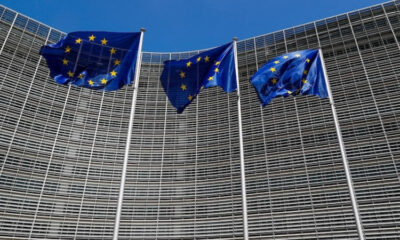Technology
Social Media Regulation Tightens as Online Harassment Cases Surge

The UK government has announced a major tightening of social media regulations following a significant rise in online harassment, cyberbullying, and digital abuse cases. With millions of users spending increasing amounts of time on platforms such as Instagram, X, TikTok, and Facebook, concerns over harmful online behavior have escalated into a pressing public issue. The new regulatory measures, introduced under the updated Online Safety Act 2026, aim to hold technology companies accountable for user protection, ensure stronger enforcement of moderation standards, and establish clear legal consequences for digital misconduct.
A Rising Crisis in Online Harassment
Online harassment has grown dramatically in recent years, affecting individuals across age groups, professions, and communities. Reports from the UK’s Internet Safety Commission show a 40 percent increase in harassment-related complaints in 2025 alone. Victims include journalists, politicians, public figures, and everyday social media users, many of whom have faced coordinated abuse campaigns, doxing, and the spread of misinformation.
Digital platforms have long been criticized for failing to curb harmful content effectively. Despite moderation tools and reporting mechanisms, enforcement has been inconsistent, and harmful material often remains online for extended periods. Victims have reported mental health consequences such as anxiety, depression, and withdrawal from digital spaces, while law enforcement agencies struggle to prosecute offenders due to jurisdictional and anonymity issues.
The updated Online Safety Act expands the powers of the communications regulator, Ofcom, granting it the authority to impose fines of up to 10 percent of a company’s global revenue for noncompliance. Social media companies are now legally required to identify and remove harmful content within a specified timeframe or face severe penalties. The legislation also mandates clearer community guidelines, user education on online safety, and improved reporting tools designed to provide real-time responses to harassment complaints.
Minister for Digital and Culture, Sarah Ellison, emphasized that the goal is to make digital spaces safer without stifling free expression. “We are not seeking to censor debate,” she said. “We are ensuring accountability. Every user has the right to participate in online life without fear of harassment or harm.”
Responsibilities and Reactions from Tech Companies
Major social media firms have responded to the new regulations with mixed reactions. While many acknowledge the importance of user safety, concerns have been raised about the feasibility and cost of compliance. Implementing proactive monitoring and verification systems requires significant investment in artificial intelligence, content moderation teams, and legal oversight.
Platforms such as Meta and X have announced new initiatives to align with the legislation. Meta plans to deploy advanced AI systems capable of detecting abusive content in real time, while X has pledged to enhance its human moderation capacity and introduce stricter verification protocols. TikTok, which has faced scrutiny over underage users’ exposure to harmful content, will introduce parental safety dashboards and expand its digital wellbeing features.
Advocacy groups have welcomed the reforms but caution that success will depend on consistent enforcement and transparency. The charity Stop Cyber Abuse called the new measures “a turning point in digital governance” but urged regulators to prioritize victim support and education in addition to punishment.
Experts also warn that tighter regulation could push abusive behavior into less regulated or encrypted platforms, complicating monitoring efforts. To address this, the government is launching a cross-agency task force combining Ofcom, the National Cyber Crime Unit, and non-profit organizations to share intelligence and develop prevention strategies.
Law enforcement agencies are receiving additional funding to train officers in handling digital crimes. The Home Office confirmed that a new Cyber Harm Response Team will operate nationwide, assisting victims and expediting investigations into online abuse and harassment.
Social and Legal Implications
The tightening of social media regulation raises broader questions about the balance between privacy, freedom of speech, and public safety. Legal scholars argue that the UK’s approach could serve as a model for other democracies seeking to address the same challenges. By emphasizing corporate accountability and data transparency, the new framework represents a shift from self-regulation toward state-enforced responsibility.
The law introduces stronger protections for minors, requiring platforms to verify user age and restrict access to potentially harmful material. Schools and youth organizations will also receive government support to deliver digital citizenship programs, teaching young people how to navigate online spaces safely and responsibly.
Public opinion appears to support the government’s action. A national survey by Ipsos UK found that 78 percent of respondents believe social media companies should bear greater responsibility for harmful content, and 65 percent support stricter penalties for noncompliance. Mental health professionals have similarly endorsed the initiative, citing the increasing correlation between online abuse and self-harm, particularly among teenagers and young women.
However, free speech advocates have expressed concerns that broad regulatory powers could lead to overreach or the unintentional suppression of legitimate expression. To mitigate these risks, the legislation includes provisions for independent oversight and periodic reviews to ensure compliance measures remain proportionate and evidence-based.
Conclusion
The surge in online harassment has become one of the defining challenges of the digital era, demanding urgent and coordinated action. With the introduction of stricter social media regulations, the UK is positioning itself as a global leader in online safety and digital accountability. The new framework sends a clear message to technology companies that protecting users is no longer optional—it is a legal and moral obligation.
As these reforms take effect, the success of the initiative will depend on sustained collaboration between government, industry, and civil society. A safer digital environment will not only protect individuals but also restore public trust in the internet as a space for communication, creativity, and connection. The next chapter in the UK’s digital future will be defined by how effectively this balance between freedom and responsibility can be achieved.






















